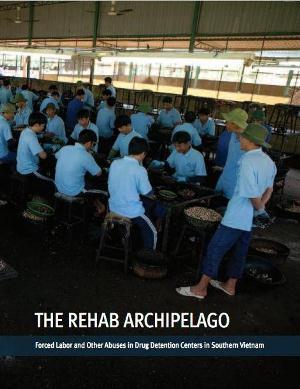Veteran, ACLU Challenge Florida Welfare Drug Test Law [FEATURE]
Florida's new law requiring applicants for the Temporary Assistance to Needy Families (TANF) program to take and pass a drug test in order to receive benefits is being challenged by the American Civil Liberties Union of Florida (ACLUFL). The group filed a class-action lawsuit in federal district court in Orlando Tuesday arguing the new law was unconstitutional and seeking a temporary injunction to block its implementation.
Under the law, which passed Florida's House and Senate in April and May respectively, applicants can be denied public assistance for a year if they fail the drug test and denied for three years if they fail a second drug test. Persons who complete drug treatment can regain eligibility, and the children of people denied benefits can receive funds through a designated trustee.
The lawsuit, Lebron v. Wilkins, names a Central Florida man, Luis Lebron, as the lead plaintiff. Lebron, a Navy veteran, single father, and University of Central Florida student who is looking for work, was denied TANF benefits after refusing to submit to a drug test. Lebron, who also cares for his disabled mother, did accounting and payroll work in the Navy and in the private sector before returning to college. He is expected to graduate with an accounting degree in December.
"Florida's new law assumes everyone who seeks public assistance has a drug problem," said Lebron. "They don't know that I'm in school right now so I can get a good job to provide for my son and mother, and it feels like they don't care. I have to prove to them that I'm not breaking the law. It makes me sick and angry that for no reason at all and no suspicion, I have to prove I'm not using drugs. The Fourth Amendment is part of the Bill of Rights, and it says no searches without probable cause."
The pivotal question, Lebron said, is whether the searches are reasonable. "Searches must be based on individualized suspicion," he noted. "In the Navy, I swore an oath to defend the Constitution. Now, I'm asking for the Constitution to defend me."
Florida Gov. Rick Scott (R) championed the new welfare drug testing law, arguing that welfare recipients used drugs at a higher rate than the population at large and that the law would save Florida taxpayers money. A number of similar bills have been filed in other states as well, and rumblings of Congressional hearings on the proposal have been heard inside the Beltway as well.
But so far the numbers have failed to borne out Scott's claims about welfare recipients or budget savings. A 1996 study of alcohol and illicit drug use by the National Institute on Alcohol Abuse and Alcoholism found that welfare recipients' use rates to be the same as the population at large. And according to Florida's Department of Children's Services, only about 2% of TANF applicants have tested positive for drugs in the new program so far. At that rate, the state will arguably save a few tens of thousands of dollars each year in a program that is budgeted at $168 million a year. But even those savings are debatable, given that it is difficult to factor in the costs of administering the program -- or defending it against legal challenges or individual claims of false positives.
The one clear winner in the welfare drug testing program is Florida's drug testing industry. Each TANF applicant must take a drug test at a cost of $30-35 and pay for it out of his own pocket. If the test comes back negative, the state reimburses the applicant. The net result is a transfer of funds from the TANF program to drug test providers.
"Our legal claim is straightforward and should come as no surprise to the state of Florida," said Maria Kayanan, the lead attorney in the case. "The only state in the country to try this in the past failed miserably. Throughout the session, legislative staff warned the legislature that this law raised legal challenges."
Kayanan was referring to Michigan, which enacted a law requiring suspicionless drug testing of welfare recipients in the 1990s. That law was overturned as unconstitutional by a federal district court judge in a decision upheld by the US 6th Circuit Court of Appeals.
"This is bad policy, it's a mess, and we hope the court recognizes that suspicionless drug testing absent a clear showing of risk to public safety violates the Fourth Amendment," she said.
Federal courts have held that government-imposed drug testing absent particularized suspicion is unconstitutional except in very limited circumstances. The courts have carved out exceptions allowing drug testing in occupations where the public safety is at risk, for law enforcement personnel involved in drug enforcement, and for high school students engaged in extracurricular activities, but that is as far as the federal judiciary has been willing to bend the Fourth Amendment to date.
"This is a slippery slope," said Randy Berg, executive director of the Florida Justice Institute, which is co-counsel in the case. "While implemented here to go after people in need of public assistance to protect their families, who is next? People who apply to get a fishing license? Contractors who contract with the state? It is very important that people see this as a slippery slope. That is why we have stepped forward to challenge this unconstitutional bill enacted by the legislature."
"After the Michigan law was struck down, a number of states have started rekindling this idea, but Florida was the first state to enact this," said Simon. "But this public policy that the legislature adopted at the urging of the governor is based only on ugly stereotypes and talking points. He keeps saying that taxpayers have a right to know their money is not being used to subsidize drug addiction. But this method is unconstitutional, and we are confident it will be found unconstitutional again."
In response to a question echoing a commonly heard plaint, Simon explained why workers in the private sector must sometimes submit to drug testing when welfare applicants do not.
"The government is bound by the Constitution and private employers are not," he pointed out. "Things that may be appropriate in the private sector are impermissible when done by the government. The governor is also a lawyer, but he must have slept through constitutional law."
"I served my country, I'm in school finishing my education and trying to take care of my son," Lebron said. "It's insulting and degrading that people think I'm using drugs just because I need a little help to take care of my family while I finish up my education."
Now, a federal court in Florida will decide if requiring Lebron to submit to a drug test, is not only insulting and degrading to him, but unconstitutional. With efforts to impose similar laws on welfare applicants and people seeking unemployment benefits underway in a number of other states and possibly Congress, this Florida case will have ramifications reaching far and wide.
Vietnam Using Drug Takers as Slave Labor [FEATURE]
Vietnamese drug users detained by the police are held for years without due process, subjected to torture and physical violence, and forced to work as low- or no-wage labor in camps that are supposed to be drug treatment centers, according to an explosive new report released Wednesday by Human Rights Watch, which called for the camps to be closed and the prisoners released.

Those who refuse to work or who violate camp rules are subject to punishments that Human Rights Watch said in some cases amounts to torture. It cited the experience of Quynh Luu, a former detainee who was caught trying to escape.
"First they beat my legs so that I couldn't run off again," Quynh said. "Then they shocked me with an electric baton and kept me in the punishment room for a month."
Quynh's case is hardly an exception, said the human rights monitoring organization, which talked to numerous current and former prisoners.
"People did refuse to work but they were sent to the disciplinary room. There they worked longer hours with more strenuous work, and if they balked at that work then they were beaten. No one refused to work completely," said Ly Nhan, who was detained in Nhi Xuan center in Ho Chi Minh City for four years.
"Work was compulsory," said Luc Ngan, who was a minor when he began more than three years in detention at Youth Center No. 2 in Ho Chi Minh City. "We produced bamboo furniture, bamboo products, and plastic drinking straws. We were paid by the hour for work -- eight-hour days, six days a week."
While workers were paid, they never saw the money, said Quynh, who spent five years at Center No. 3 in Binh Duong province. "On paper I earned 120,000 Vietnamese dollars a month, but they took it. The center staff said it paid for our food and clothes."
"If we opposed the staff they beat us with a one-meter, six-sided wooden truncheon. Detainees had the bones in their arms and legs broken. This was normal life inside," said Dong Ban, who was imprisoned for more than four years in Center No. 5 in Dak Nong province.
"Tens of thousands of men, women and children are being held against their will in government-run forced labor centers in Vietnam," said Joe Amon, health and human rights director at Human Rights Watch. "This is not drug treatment, the centers should be closed, and these people should be released."
The Vietnamese embassy in Washington did not return a call for comment Wednesday.
The system of forced labor camps for drug users originated with "reeducation through labor" camps for drug users and prostitutes established after the North Vietnamese victory over the South in 1975. They received a renewed impetus in the mid-1990s as the government launched a campaign to eradicate "social evils," including drug use. Their numbers have grown as the Vietnamese economy has expanded, more than doubling from 56 in 2000 to 123 at the beginning of this year.
Perversely, international donations to support drug treatment centers and to the Ministry of Labor, Invalids and Social Affairs have enabled the regime to continue to hold HIV-positive drug users against their will, even though Vietnamese law says they have the right to be released if they are not receiving appropriate medical care. Since 1994, international donors have sought to "build capacity," including training staff in drug treatment and support for HIV interventions, but Human Rights Watch reported that most centers offer no antiretroviral treatment or even basic medical care. The group cites various reports putting the number of HIV-positive detainees at between 15% and 60% of the detainee population.
The report contains testimonies from numerous detainees and former detainees who said they were sent to the centers without a formal hearing and without ever seeing a lawyer or judge. Some were sent to the camps after being arrested by police, while others were turned in by family members who "volunteered" them, believing they would get effective drug treatment there.
"I was caught by police in a roundup of drug users," said Quy Hop, who spent four years in the Binh Duc camp in Binh Phuoc province. "They took me to the police station in the morning and by that evening I was in the drug center. I saw no lawyer, no judge."
A small number of detainees voluntarily placed themselves in the centers to get drug treatment, but even they were not free to leave. Some reported that their detention was capriciously extended by camp managers or by changes in government policy.
Human Rights Watch was unable to provide the names of any foreign companies benefiting from detainee labor, saying "the lack of transparency or any publicly accessible list of companies that have contracts with these government-run detention centers made corroborating the involvement of companies difficult." But it did cite Vietnamese media reports as saying two Vietnamese companies, Son Long JSC, a cashew processing firm, and Tran Boi Production, which manufactures plastic goods, both used detainee labor. Neither company has replied to inquiries from Human Rights Watch, the group said.
"Forced labor is not treatment, and profit-making is not rehabilitation," Amon said. "Donors should recognize that building the capacity of these centers perpetuates injustice, and companies should make sure their contractors and suppliers are not using goods from these centers."
Besides calling on the government of Vietnam to shut down the camps, Human Rights Watch is seeking "an immediate, thorough, and independent investigation into torture, ill treatment, arbitrary detention, and other abuses in the country's drug detention centers." In addition, it wants the government to make public a list of all companies with contracts for detainee labor.
Human Rights Watch also calls on international donors to review their aid to the detention centers to ensure that it is not supporting programs that violate international human rights standards and urges companies working with the detention centers to end all relationships immediately.
"People who are dependent on drugs in Vietnam need access to community-based, voluntary treatment," Amon said. "Instead, the government is locking them up, private companies are exploiting their labor, and international donors are turning a blind eye to the torture and abuses they face."
Alert: Stop New Drug Prohibitions in Congress

Along with adding new criminalization to our society already burdened by massive arrest and incarceration rates, Schedule I placement will ban medical use and make it difficult to research possible medical uses of the substances too. There's no evidence of a looming crisis over either of these substances, and Spice/K2 sales have already been barred temporarily under a DEA "emergency order" while the intended CSA process of studying a drug before making decisions about it gets carried out. Most of all, reflexively enacting new drug prohibitions at a time when prohibition itself is increasingly coming into question is backwards -- there are better options available for reducing the potential of these substances to do harm.
Please use our web form to contact your US Representative and your two US Senators in opposition to these unnecessary prohibitions. Please follow-up by calling their offices too -- if you don't know their numbers (or aren't sure who they are), you can reach them by calling the Congressional Switchboard at (202) 224-3121. And please use our tell-a-friend form to spread the word.
Click here for updates on these and similar bills in Congress, and here for new prohibition bills in the state legislatures -- votes already taken in the states are tallied here. (We don't have state alerts set up yet, but you can use our web site in the meanwhile to find out what's going on in your state and contact your legislators about it.)
Thank you for taking action!
Announcement: The 2011 International Drug Policy Reform Conference, Los Angeles
StoptheDrugWar.org (DRCNet) is pleased to be a partner in the upcoming 2011 International Drug Policy Reform Conference, this November 2-5 at the Westin Bonaventure in Los Angeles.
The Reform Conference, sponsored by our friends at the Drug Policy Alliance, is the major biennial gathering of drug policy reformers of all kinds. The last one, held in Albuquerque in 2009, brought together over 1,000 attendees representing 30 different countries. This year attendees will have the opportunity to spend three days interacting with people committed to finding alternatives to the war on drugs while participating in sessions given by leading experts from around the world. Click here to register -- early bird rates are available through September 16, and discounts are available for students.
Some testimonials from the 2009 conference:
"You leave the conference inspired and informed. Meeting this crowd of wise, energetic kindred spirits recharges your reform batteries."
--Michael Jourdan, Centre of Alcohol and Drug Research, Copenhagen, Denmark
"This is the only conference that combines X-treme intelligence, passion, and practical applications. It is the best I ever attend."
--Patt Denning, Harm Reduction Therapy Center, San Francisco, California
"A living breathing think tank of like minds, crafting out solutions that keep people's dignity and human rights intact."
--Waheedah Sahabzz-El, Community HIV / AIDS Mobilization Project, Philadelphia, Pennsylvania
"This conference provided a new beginning for me, I now have a true passion for DPR."
--Susanne Widmer, Albuquerque, New Mexico
"The Reform Conference gave me the courage to return to my Canadian community and give voice to the common sense of Drug Policy Reform. The experience provided me with the evidence, language and tools to be a credible, educated leader in changing the way we approach the issue of substance use in our community."
--Patty Hajdu, Thunder Bay District Health Unit, Thunder Bay, Ontario, Canada
Hope to see you there.
Colombian High Court Re-Legalizes Drug Possession
In an August 24 ruling, the Colombian Supreme Court rejected a 2009 constitutional amendment recriminalizing the possession of personal use amounts of illegal drugs. Prior to that amendment, pushed vigorously by then President Alvaro Uribe, the possession of small amounts of drugs for personal use had been legal under a 1994 Constitutional Court decision.

The ruling overturning Uribe's amendment came in the case of Juan Carlos Vela Gomez, a teenager sentenced to five years in prison after being caught with 80 grams of marijuana. Although Vela Gomez carried more than the 20 gram personal use amount, the court still found that subjecting him to a lengthy prison sentence violated "personal freedoms."
The move is a welcome step and one in line with drug policy reforms in other Latin American countries, but as Insight Crime noted, Colombia still has some of the most repressive drug policies in the region. More than 12,000 were doing time for drug crimes in Colombian prisons at the end of 2009, up 3% over 2003, and most of them are believed to be low-level offenders, including drug couriers and coca-leaf pickers.
Colombia has received around $6 billion in US anti-drug assistance since the inauguration of Plan Colombia in the late 1990s.
Arkansas Relaxes Marijuana Possession Penalties
As of September 2, a new law that relaxes the penalty for some marijuana offenses has gone into effect in Arkansas. Under the new law, people caught in possession of up to four ounces may be sentenced to a year's probation without formal charge, at the judge's discretion.

Also, under the previous Arkansas law, possession of anything more than an ounce was punished by four to 10 days in jail and large fines. Now, someone possessing as much as four ounces will be eligible for probation.
The new law also lessons the penalties for repeat possession offenders and makes possession with the intent to deliver small amounts of marijuana a misdemeanor instead of a felony.
The law was passed last spring by the legislature and backed by Gov. Mike Beebe (R), who signed it into law in March.
Mexico Drug War Update
by Bernd Debusmann Jr.
Mexican drug trafficking organizations make billions each year smuggling drugs into the United States, profiting enormously from the prohibitionist drug policies of the US government. Since Mexican president Felipe Calderon took office in December 2006 and called the armed forces into the fight against the so-called cartels, prohibition-related violence has killed around 40,000 people, including more than 15,000 last year. The increasing militarization of the drug war and the arrest or killing of dozens of high-profile drug traffickers have failed to stem the flow of drugs -- or the violence -- whatsoever. The Merida initiative, which provides $1.4 billion over three years for the US to assist the Mexican government with training, equipment and intelligence, has so far failed to make a difference. Here are a few of the latest developments in Mexico's drug war:

In Mexico City,two female journalists were found murdered. Ana Maria Marcela Yarce Viveros and Rocio Gonzalez Trapaga were discovered by joggers in a park in a working class neighborhood. Both were naked. Yarce was a reporter for the investigative journalism magazine Contralinea and Gonzalez was a freelance journalist who used to work for Televisa.
Friday, September 2
Near Reynosa, police discovered the body of a top Gulf Cartel boss. Samuel Flores Borrego, 39, also known as "El Metro 3," appears to have been killed by members of his own organization for reasons that remain unknown. The body of Flores was found alongside that of a police officer. Both men had been shot. Flores, for whom the US Government had been offering a $5 million reward, is widely credited with being responsible for the bloody rift between the Gulf Cartel and their former enforcers, the Zetas, after he killed a high-ranking member of the Zetas in January 2010 in Reynosa. His replacement has already been identified as his former second-in-command, Mario Armando "Pelon" Ramirez Trevino.
In Hidalgo, 16 police officers were among 31 suspects taken into custody on suspicion of working for the Zetas. Authorities said that the arrests came after a cartel payroll was discovered during an arrest. Hidalgo is the home state of Zeta boss Heriberto Lazcano Lazcano, "El Lazca."
In Mexico City, President Calderon delivered a state of the nation speech in which he vowed to clean up corruption in Mexico's police forces by the time he leaves office by the time he leaves office in December 2012. He also announced the creation of a special federal prosecutor who will be in charge of identifying victims of the violence and find people who have disappeared.
Sunday, September 4
In Torreon, six people were killed during a series of incidents near the city's main stadium. Among the dead were three police officers who were killed after being ambushed by heavily armed gunmen. The same stadium was the scene of an August 20 shooting, which caused spectators and players to panic and run for cover. The game was called off.
Monday, September 5
In Nogales, police discovered an underground tunnel dug into a drainage tunnel that leads into the United States. Police found the tunnel using information they received after the discovery of another tunnel on August 16. Nogales is across the border from Nogales, Arizona.
In Jalisco, a high-ranking Sinaloa Cartel member was recaptured 40 days after escaping from a Mexico City hospital where he was taken after his original arrest on May 12. Guajardo Hernandez, "El Guicho," is known to have operated in Baja California and had an important role in arranging shipments of cocaine from Colombia to Mexico.
Tuesday, September 6
In Mexico City, authorities announced that an American citizen was arrested last week for smuggling grenades to the Sinaloa Cartel. Jean Baptise Kingery was arrested in Mazatlan, Sinaloa. Kingery was also arrested in Arizona in August 2010, but was released, purportedly so that American law enforcement agencies could use him as an informant or in a sting operation.
[Editor's Note: We can no longer accurately enumerate the number of deaths in the Mexican drug wars this year. The Mexico City newspaper El Universal had been running a tally on which we relied, but it stopped. Our estimate for this year's death toll is just that -- an estimate.]
Total Body Count for 2007 (approx.): 4,300
Total Body Count for 2008 (approx.): 5,400
Total Body Count for 2009 (approx.): 9,600
Total Body Count for 2010 (official): 15,273
Total Body Count for 2011: (approx.): 7,000
This Week's Corrupt Cops Stories
We've got two weeks worth of law enforcement bad apples this week. The barrel is getting pretty full of them. Let's get to it:

In Alexandria, Louisiana, a Rapides Parish Sheriff's Office narcotics field supervisor was arrested August 25 on charges related to "improper activities with three female offenders." Lt. Michael Lacour, 33, is charged with three counts of malfeasance in office. Although officials were mum on the particulars, the sheriff's office did say that it got a complaint from one of the women and that his arrest stemmed from his off-duty activities. Lacour has been suspended with pay and is out on a $3,000 bond.
In Greenup, Kentucky, a Greenup County jail guard was arrested August 29 for allegedly peddling Oxycontin to prisoners while on duty. Guard Causetta Cox-Tackett, 33, is charged with trafficking a controlled substance and promoting contraband. She went down after an internal investigation by the Greenup County Detention Center and the Greenup County Sheriff's Office. She is currently residing at her place of employment.
In New Port Richey, Florida, a former Pasco County sheriff's deputy was arrested August 30 after being caught with marijuana, prescription pills, and drug paraphernalia in his patrol car. Marshall DeBerry is accused of not turning in drugs and paraphernalia in at least 10 cases. Not all the missing drugs have been found, and DeBerry told investigators some may have "fallen out" of his patrol car. He is charged with tampering with or fabricating physical evidence. He went down after investigators got a tip about drugs in his patrol car. DeBerry had previously risen to the rank of corporal, but had been demoted to sheriff's deputy in 2008 after warning an informant of an impending raid. He is out on a $5,000 bond pending trial.
In Saluda, Virginia, the Middlesex County sheriff was indicted August 31 on 25 felony counts for taking boats, cars, and cash that belonged to the county and converting them for his own use. Sheriff Gus Abbott, who is still on the job, faces charges of misappropriation of funds, bribery and embezzlement. He allegedly took a Volvo and three boats and is charged with 18 counts of misusing money from the county asset forfeiture fund and credit cards. He is also charged with three counts of bribery for receiving more than $1,200 from an unnamed individual. He was released on his own recognizance pending trial.
In Marion, Illinois, a Williamson County sheriff's deputy was arrested September 1 on charges he took seized marijuana and gave it to a third party to sell. Deputy Caleb Craft is charged with theft, unlawful possession of cannabis, and official misconduct. Craft, a member of the Southern Illinois Enforcement Group (SIEG), went down after SIEG got information about one of their own gone bad. Craft was last reported being held at the Jackson County jail pending a bond hearing.
In Las Cruces, New Mexico, the former Columbus police chief pleaded guilty August 25 to conspiring to run guns to a Mexican drug cartel. Former Chief Angelo Vega had been arrested in March along with a former town trustee, a former town mayor, and 10 others after being indicted on an 84-count gun-running indictment. Vega earned more than $10,000 from last October through March by conducting counter-surveillance for La Linea, the enforcement arm of the Juarez Cartel, using a town vehicle to run guns to Mexico, and purchasing thousands of dollars worth of body armor, boots, helmets, and clothing, including bulletproof vests for a La Linea leader. He pleaded guilty to conspiracy, aiding in the smuggling of firearms, and extortion under color of the law. Vega and his co-conspirators used their positions to traffic around 200 guns to Mexico, including assault rifles. He faces up to 35 years in federal prison.
In San Juan, Puerto Rico, a former Arecibo police officer was convicted August 30 of providing security for drug dealers. David Gonzalez Perry was found guilty of 28 counts of conspiracy and drug-related charges for providing security for 15 separate cocaine transactions and receiving $36,000 to do so. He also recruited 15 other people into drug trafficking conspiracies. He's looking at a mandatory minimum 10-year sentence and up to life in prison.
In Tulsa, Oklahoma, one Tulsa police officer was convicted and one acquitted August 30 in a long-running corruption scandal that featured the use of manufactured evidence against innocent parties, some of whom were imprisoned, lying on search warrant affidavits, and perjured testimony. Officer Jeff Henderson was convicted of eight counts of perjury and civil rights violations, while Officer Bill Yelton was acquitted on all charges against him. Henderson was acquitted on more than 40 other counts related to individuals who have filed lawsuits against the city of Tulsa claiming they were imprisoned based on the results of search warrants for which Henderson wrote false affidavits. The verdicts mark the end of a federal investigation of Tulsa police officers and a federal agent that began in late 2008 and resulted in charges against six Tulsa police officers and the federal agent. One Tulsa officer and the federal agent pleaded guilty and two other Tulsa officers were convicted in the case. Two others were acquitted, but remain suspended while the department investigates whether they violated internal policies. Henderson is looking at up to 32 years in prison, and the city of Tulsa is still looking at having to defend a mess of lawsuits from victims of the rogue cops.
In Los Angeles, an LA County sheriff's captain has been placed on paid leave after a voice thought to be hers was heard on a wiretap directed at several drug trafficking suspects. Capt. Bernice Abram has been on leave since April, although the story just broke late last month. She was put on leave after federal authorities notified sheriff's officials that their captain may have been heard on the narcotics wiretap. Officials are trying to determine whether hers is the voice in the recordings and what relationship she had with the suspects. Earlier last month, FBI and other agents arrested the drug trafficking suspects, members of a Compton-based drug ring.
NYPD Undercover Cop Kills Man Intervening in Drug Arrest
An NYPD undercover narcotics officer shot and killed a man who attempted to intervene during a street drug arrest Tuesday afternoon. John Collado, Sr., 43, becomes the 35th person to be killed in US domestic drug law enforcement operations so far this year, and the third in the past week.

In another report, police said the officer was breaking up a drug deal between Collado and the young man. "As the officer tried to arrest one of the suspects... the other suspect put the officer in a chokehold," that report said.
But Collado's son, John Collado, Jr., told New York City media outlets that his father was not involved in a drug deal. Instead, said Collado, Jr., he and his father were just walking by when they saw someone they knew being assaulted by an unidentified person.
"My dad's not a moron," he said. "If he would have identified himself as a cop, my dad would have stopped. He got shot in the stomach, trying to stop an unidentified cop in a scuffle with a civilian, a kid I grew up with, my dad's neighbor. He went to break it up, the cops shot him in the stomach, and he's in trauma," he said Tuesday. "They won't let me know anything that's going on."
NYPD said that the officer identified himself.
Man With Gun Killed in Kentucky Drug Raid
[Editor's Note: This year, Drug War Chronicle is trying to track every death directly attributable to domestic drug law enforcement during the year. We can use your help. If you come across a news account of a killing related to drug law enforcement, please send us an email at [email protected].]
[Editor's Note: After we published this article, we were contacted by a woman identifying herself as the sister of the victim. See her comments at the end of the article.]

According to police, members of the Buffalo Trace Narcotics Task Force were conducting a drug bust in the home when Pruitt pulled a gun and a member of the unit shot and killed him. In another version of events, police said Pruitt shot at an officer before the officer returned fire.
But a Kentucky State Police spokesman told WKYT-TV only that Pruitt had pointed a weapon at police. "The individual inside the residence took an offensive posture and pointed a gun at one of the officers and then the officer reciprocated," said Trooper Endre Samu. Samu said that Pruitt had been hiding under a bed, then got up and threatened one of the undercover agents.
The raid took place shortly before 5:00pm. There is no indication whether officers had announced their presence or if the raid was a "no-knock" raid.
Pruitt's girlfriend, Laura Johnson, 52, who lived in the house with him was detained at the scene and later charged with an unspecified drug trafficking offense. She was being held at the Montgomery County Jail.
Neighbor Angela Martin said she was "in shock" over the killing. "I'm still kind of in shock over it because he didn't seem like the type to be involved in that. He was a great neighbor. He came over and mowed my grass when my mower was down. He was real friendly, real clean-cut guy, real neighborly," Martin said. "It's a horrible story that ended bad, and I just hate seeing something like this happen. That's somebody's son, somebody's father, somebody's grandson, you know, and it's just a horrible way for him to go out," said Martin.
The killing will be investigated by the Kentucky State Police.
In an email to Drug War Chronicle, a woman describing herself as Pruitt's sister, Barbara Seebach questioned the police version of events."His girlfriend says he was in bed asleep, and I believe her," she wrote. "I know he wouldn't fit under the bed, and if he was raising up from the side, why couldn't they have grabbed him before he got up? It doesn't make any sense, and I think someone needs to sit down with the family and tell the truth."
In a second email, Seebach described what led to the bust. "I know that Laura was charged with trafficking four pills," she wrote. "She sold four pills to someone she thought was a friend, and the next thing you know the cops were at her door. So, is that a set-up, or what?"
Trapped Trooper Kills Minnesota Woman Fleeing Drug Bust
Editor's Note: This year, Drug War Chronicle is trying to track every death directly attributable to domestic drug law enforcement during the year. We can use your help. If you come across a news account of a killing related to drug law enforcement, please send us an email at [email protected].]

According to the State Patrol, the incident began as a routine traffic stop on I-94 Saturday afternoon when the unnamed trooper pulled Doree over for an "equipment violation." The trooper noticed a large amount of "a white crystalline substance" during their interaction and was investigating when Doree jumped back into her vehicle and tried to flee. The trooper's arm got tangled in the steering wheel as she drove off, and she dragged the trooper approximately 30 yards before he was able to unholster his weapon and shoot her. The trooper received minor injuries.
The white substance was later confirmed to be "a very substantial amount of narcotics," said State Patrol spokesman Lt. Eric Roeske. It is not clear what the substance was.
Doree had no criminal record in Minnesota, but her husband, Scott Doree, 53, has numerous convictions, including several for possession of methamphetamine and marijuana.
The unnamed trooper has been put on paid leave pending an investigation of the incident by the state Bureau of Criminal Apprehension, which is charged with investigating officer-involved killings in the state.
This Week in History
September 13, 1994: President Clinton signs The Violent Crime Control and Law Enforcement Act of 1994 (P.L. 103-322), which includes provisions to enhance penalties for selected drug-related crimes and to fund new drug-related programs.

September 13, 1999: The US 9th Circuit Court rules that seriously ill patients should be allowed marijuana if the need is there.
September 8-9, 2000: Green Party presidential candidate Ralph Nader joins New Mexico's Republican Governor Gary Johnson in criticizing the nation's war on drugs, calling for the legalization of marijuana and reform of what Nader calls "self-defeating and antiquated drug laws." Rehabilitating drug addicts gives a far better payoff than "criminalizing and militarizing the situation," he said. "Study after study has shown that, and yet somehow it doesn't get through to federal policy."
September 13, 2000: Eleven-year-old Alberto Sepulveda of Modesto, California, is shot dead during a SWAT raid targeting his father, when an officer on the scene accidentally squeezes off a shot, killing the boy instantly. A year and a half later the family settles a federal lawsuit over the death.
September 12, 2002: In Petaluma, CA, the Genesis 1:29 medical marijuana dispensary is raided by the DEA, and Robert Schmidt, the owner, is arrested. Agents also raid a garden in Sebastopol, which supplied the Genesis dispensary.
September 10, 2004: NewScientist.com news service releases an article entitled "Cannabis Truly Helps Multiple Sclerosis Sufferers," reporting on new research confirming marijuana's efficacy in treating pain and muscle spasms associated with sufferers of the disease.